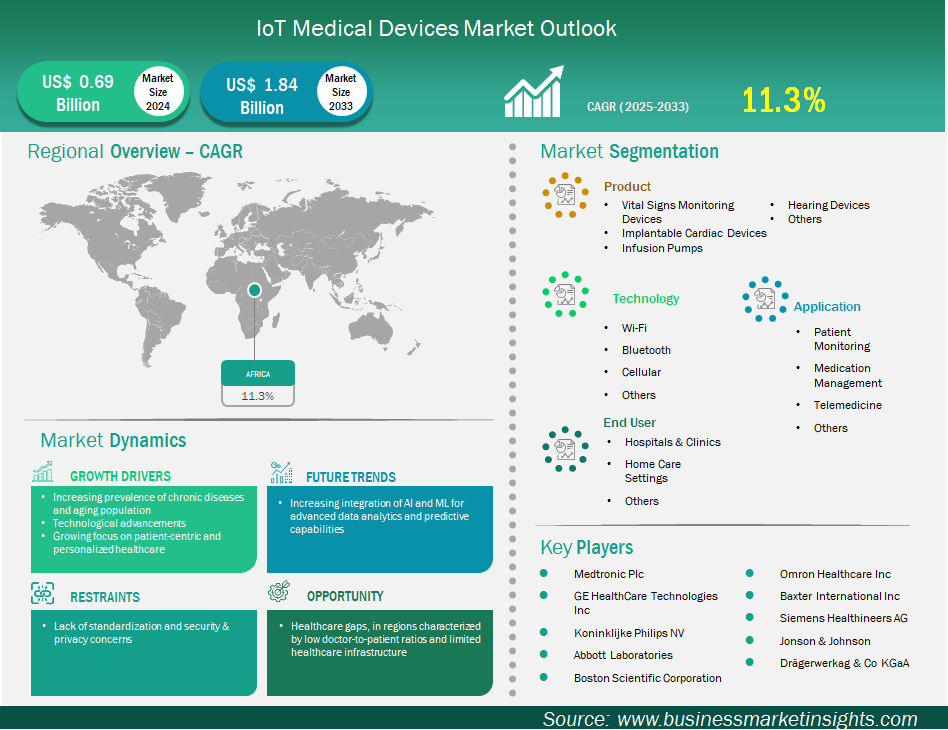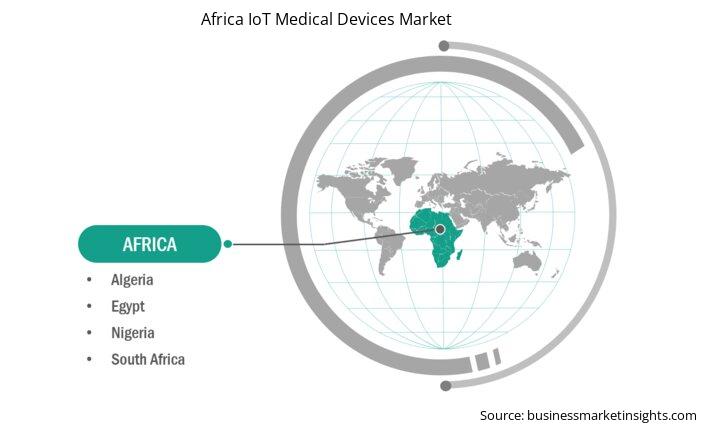Africa IoT medical devices market size is expected to reach US$ 1,837.3 million by 2033 from US$ 699.2 million in 2024. The market is estimated to record a CAGR of 11.3% from 2025 to 2033.
Executive Summary and Africa IoT Medical Devices Market Analysis:
The IoT medical devices market in Africa is experiencing significant growth driven by increasing prevalence of chronic diseases and aging population, growing focus on patient-centric and personalized healthcare, and technological advancements. The increase in internet penetration and awareness of digital health solutions in Africa have built a foundation for the connected medical device usage.
While there is considerable interest around the potential of IoT in the area of health care, there are many constraints to the widespread adoption of IoT technologies in healthcare. One of the most significant challenges is the very limited healthcare resources, and the condition of under-developed healthcare systems. In many African nations, it involves enormous and unrecoverable upfront costs for both the IoT device and supporting digital infrastructure. The lack of reliable internet connectivity and consistent power, particularly in rural areas, created significant barriers and challenges for connected medical devices. Moreover, regulatory uncertainty and incomplete and inconsistent data protection and cybersecurity frameworks obstruct the use of IoT devices. The shortage of skilled technical personnel to implement and maintain these technologies is another serious challenge. Ultimately, economic and budgetary restrictions have continued to hinder on prospects for an IoT medical device market in Africa. There are still considerable and deeply entrenched structural, economic, and regulatory limitations which must be addressed for IoT medical devices adoption in Africa.

Key segments that contributed to the derivation of the IoT Medical Devices market analysis are product, technology, application, and end user.
Africa IoT Medical Devices Market Outlook
The Africa IoT medical devices market is segmented into Egypt, South Africa, Nigeria, and Algeria. The African IoT medical devices market is still maturing, but is showing strong potential. It is expected to grow modestly. Africa has a rapidly expanding population, and the population in Africa is rapidly becoming urban. At the same time, healthcare systems in Africa are contending with the burdens of infectious and non-communicable diseases. There is an urgent need for products that can provide equitable access to effective healthcare. IoT medical devices have the potential to address significant gaps in care, and especially in rural and remote areas. They liberate the monitoring of patients remotely, can offer better diagnostics, and allow for better management of resources within existing health facilities. IoT medical devices can also lessen the profound depletion in healthcare practitioners and infrastructure. The increased adoption of mobile technology in Africa and the expansion of getting online in different regions will facilitate connected health solutions including telemedicine and mobile health services. Additionally, there is a growing awareness among African populations of the importance of preventive care, which will increase demand for IoT personal medical devices in the next few years.
Africa IoT Medical Devices Market Country Insights
Based on country, the Africa IoT medical devices market is segmented into Egypt, South Africa, Nigeria, and Algeria. Egypt held the largest share in 2024.
The African IoT medical devices market remains in its early stages but holds significant potential for growth. This potential is driven by the urgent need to address health inequities, a high disease burden, and a rapidly growing population. IoT technologies also offer opportunities to improve healthcare infrastructure through remote monitoring and more efficient resource management. However, several challenges hinder progress. These include limited healthcare budgets, poor connectivity, fragmented regulatory frameworks, and shortages in skilled human resources. Country-specific dynamics also influence the pace and direction of development. Egypt is advancing its digital health agenda. South Africa is focusing on infrastructure improvements. Algeria is gradually embracing digital health, despite regulatory constraints. Nigeria presents major opportunities, though it continues to face significant infrastructure and governance barriers. Each of these countries is exploring how IoT can enhance healthcare access and operational efficiency within their unique contexts.
| Report Attribute | Details |
|---|---|
| Market size in 2024 | US$ 699.2 Million |
| Market Size by 2033 | US$ 1,837.3 Million |
| CAGR (2025 - 2033) | 11.3% |
| Historical Data | 2022-2023 |
| Forecast period | 2025-2033 |
| Segments Covered |
By Product
|
| Regions and Countries Covered |
Africa
|
| Market leaders and key company profiles |
|
Medtronic Plc, GE HealthCare Technologies Inc, Koninklijke Philips NV, Abbott Laboratories, Boston Scientific Corporation, Omron Healthcare Inc, Baxter International Inc, Siemens Healthineers AG, Jonson & Johnson, and Drägerwerkag & Co KGaA, are among the key players operating in the market. These players adopt strategies such as expansion, product innovation, and mergers and acquisitions to stay competitive in the market and offer innovative products to their consumers.
Africa IoT Medical Devices Market Research Methodology:
The following methodology has been followed for the collection and analysis of data presented in this report:
The research process begins with comprehensive secondary research, utilizing both internal and external sources to gather qualitative and quantitative data for each market. Commonly referenced secondary research sources include, but are not limited to:
Note: All financial data included in the Company Profiles section has been standardized to US$. For companies reporting in other currencies, figures have been converted to US$ using the relevant exchange rates for the corresponding year.
Business Market Insights conducts a significant number of primary interviews each year with industry stakeholders and experts to validate and analyze the data and gain valuable insights. These research interviews are designed to:
Primary research is conducted via email interactions and telephone interviews with industry experts across various markets, categories, segments, and sub-segments in different regions. Participants typically include:

The Africa IoT Medical Devices Market is valued at US$ 699.2 Million in 2024, it is projected to reach US$ 1,837.3 Million by 2033.
As per our report Africa IoT Medical Devices Market, the market size is valued at US$ 699.2 Million in 2024, projecting it to reach US$ 1,837.3 Million by 2033. This translates to a CAGR of approximately 11.3% during the forecast period.
The Africa IoT Medical Devices Market report typically cover these key segments-
The historic period, base year, and forecast period can vary slightly depending on the specific market research report. However, for the Africa IoT Medical Devices Market report:
The Africa IoT Medical Devices Market is populated by several key players, each contributing to its growth and innovation. Some of the major players include:
The Africa IoT Medical Devices Market report is valuable for diverse stakeholders, including:
Essentially, anyone involved in or considering involvement in the Africa IoT Medical Devices Market value chain can benefit from the information contained in a comprehensive market report.
Please tell us your area of interest
(Market Segments/ Regions and Countries/ Companies)